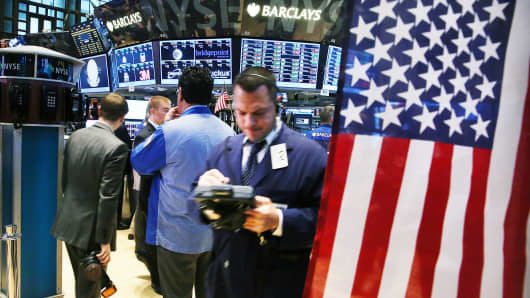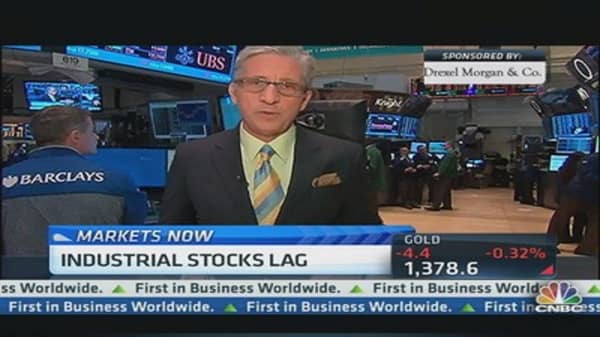In 2011 they actually cut the ratings from AAA to AA; in Monday's decision, they simply lifted the outlook. Still, in theory this will keep borrowing costs lower for the U.S. government. In effect, this is an endorsement that the economy is healthier and the Federal Reserve is doing its job.
I say in theory because the bond market weakened — mainly because it is playing into the Fed's tapering debate. This makes the argument stronger for scaling back the Fed's bond buying sooner rather than later. Stocks moving up is a positive, indicating that this is good news.
Elsewhere:
1) Mixed data out of Asia: Japan's Nikkei up 4.9 percent overnight, its biggest gain since March 2011, as revised GDP showed Japan's economy expanded at an annualized rate of 4.1 percent in the first quarter. That was well above estimates of a 3.5 percent gain. Japanese stocks Toyota Motors, Sony, Nomura, and Mitsubishi gain two to three percent.
Meanwhile, China's data disappointed. May exports grew at an anemic one percent in May (the lowest in a year and a huge swing from April — when exports were up 14 percent!) There was a crackdown by authorities on currency speculation, as many were disguising export trades to get around capital controls, which artificially inflated export numbers. Apparently, this is a more realistic figure. China is closed for the next three days.
2) Germany's Constitutional Court ruling could revive the euro zone crisis. The judicial body will will hold hearings this week on the constitutionality of the ECB's Outright Monetary Transactions (OMT) program, which are secondary market purchases of sovereign debt by the ECB. This all stems from a legal challenge in Germany, alleging that the ECB has overstepped its mandate because it is financing the deficits of sovereign countries.
A verdict that affirms this idea would be very awkward. It's widely believed that ECB intervention in the Spanish and Italian bond markets helped turned the euro-crisis around. The court cannot legally stop the ECB from continuing its program, but it can prohibit the Bundesbank — the euro zone's most influential regional central bank — from participating in it. There are even some who are arguing this may force Germany to make a decision about whether it wants to remain in the European Union. No one believes this is likely, but an affirmative ruling could bring back the euro zone crisis.
The German Constitutional Court has been very assertive on the issue of sovereignty, insisting that the German parliament (Bundestag) is the final arbiter of rules affecting Germany — not EU law or bureaucrats in Brussels.
In a big decision last September, the Court upheld the constitutionality of the European Stability Mechanism (ESM), the 500 million euro permanent rescue fund, but capped the liability at 190 billion euros and emphatically stated that Germany would not accept liability for decisions by other states. This effectively killed discussions of eurobonds, which would have been joint bonds backed by the separate members of the EU.
Bottom line: going any further in European integration would require major constitutional changes and a referendum.
3) Apple is holding its Developers Conference in San Francisco today. The usual talk of a Mac refresh, an iOS update andyes, "iRadio", seems likely (duh: Apple has 500 million iTunes accounts, Pandora has 70 million, Spotify has roughly 30 million). However, I keep waiting for the real game-changer: an "iPhone mini"--a low-priced iPhone that will compete in Asia against Samsung and other competitors.
4) stock movers: McDonald's climbs more than one percent after the food chain saw same-store sales rise 2.6 percent in May, above expectations of a gain of 1.7 percent. MCD said cheap eats and an expansion of late-night breakfast menu offerings helped boost sales.
Pandora, meanwhile, is tumbling by more than one percent ahead of Apple's conference. The iPhone maker is . expected to unveil its new streaming radio service, which is taking a bite out of P shares.
—By CNBC's Bob Pisani










